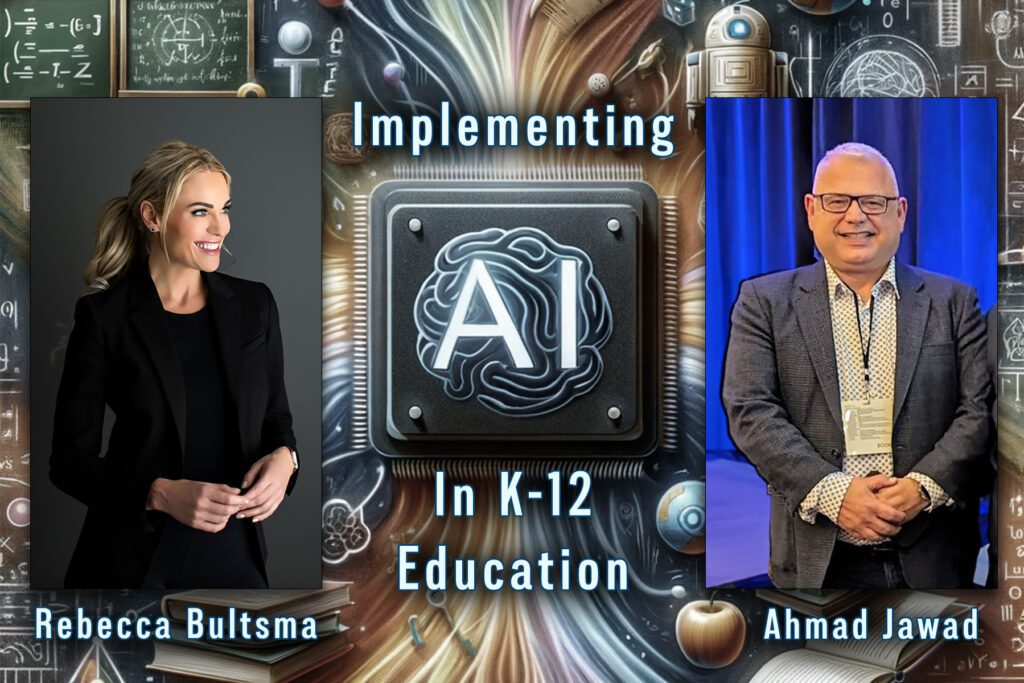Roundtable Discussion with Rebecca Bultsma and Ahmad Jawad

In the latest episode of the AI Think Tank Podcast, we ventured into the rapidly evolving intersection of artificial intelligence and K-12 education. I was fortunate to host a discussion that not only explored the transformative potentials of AI in educational settings but also tackled the complexities and ethical concerns that come with such technological integration. Joining me were friends Rebecca Bultsma and Ahmad Jawad, two notable experts who brought a wealth of knowledge and insight to our conversation.
Rebecca Bultsma, joining us from Alberta, Canada, is an international AI trainer, presenter, and enthusiast who has dedicated her career to enhancing AI literacy. Her work primarily focuses on educating professionals across North America about AI, its applications, and the careful considerations necessary when implementing it in educational environments. Over the years, Rebecca has become a vocal advocate for the ethical use of AI, particularly in education, contributing to various panels and committees to promote responsible practices.
Alongside Rebecca was Ahmad Jawad, CEO of Doceo AI, and ed-tech company Intellimedia. Also based in Alberta, Ahmad has led his company in developing educational solutions that have been widely adopted by numerous school districts. His efforts have established him as a strategic thinker in the realm of K-12 education, where he continues to explore how AI can enhance educational outcomes while ensuring the technology is used responsibly and effectively.
Our discussion opened with a reflection on the potential of AI to revolutionize the educational landscape. I shared my excitement about AI’s capacity to personalize learning experiences and streamline administrative operations, making education more efficient and accessible. However, we quickly acknowledged the challenges that accompany these advancements, particularly issues surrounding data privacy, the digital divide, and the possibility of biases embedded within AI algorithms.

Rebecca emphasized the importance of foundational AI literacy for educators and administrators. She passionately spoke about her experiences training educational leaders, highlighting the frequent questions about starting points for AI integration and the development of comprehensive policies that align with ethical standards. Her stories from various training sessions illustrated the widespread curiosity and concern about how best to implement AI in schools.
Ahmad provided insights into the practical applications of AI within educational institutions. He discussed how his company’s solutions have enabled personalized learning paths and real-time analytics, helping educators better understand and support their students’ learning journeys. However, Ahmad was quick to point out that the successful implementation of AI requires more than just technological adoption; it demands a thorough understanding of educational goals and ethical considerations to ensure that AI tools are used to their fullest potential without compromising student welfare.
As we went deeper into the ethical implications of AI in education, both Rebecca and Ahmad underscored the need for robust frameworks to manage AI usage in schools. We discussed the importance of transparency in how student data is handled and the steps necessary to prevent AI from exacerbating existing educational inequalities. The conversation often circled back to the idea that while AI can offer significant benefits, it must be deployed thoughtfully and with a steadfast commitment to equity and fairness.
In our conclusion, we considered the future of AI in K-12 education with a mix of optimism and caution. It was clear from our discussion that AI holds tremendous promise for transforming education by making learning more engaging and tailored to individual needs. Yet, both Rebecca and Ahmad reminded us that this technological journey must be navigated carefully, with ongoing attention to the ethical dimensions of AI use.
Subscribe to the AI Think Tank Podcast on YouTube.
Would you like to join the show as a live attendee and interact with guests? Contact Us
